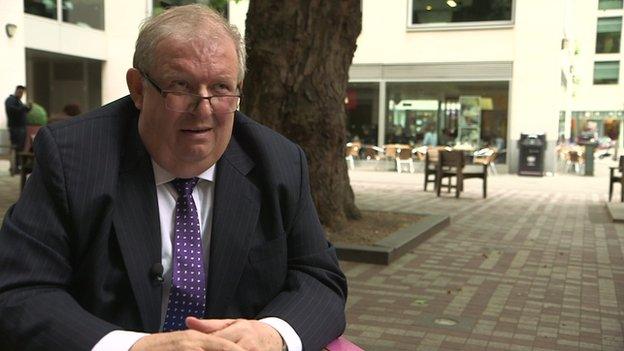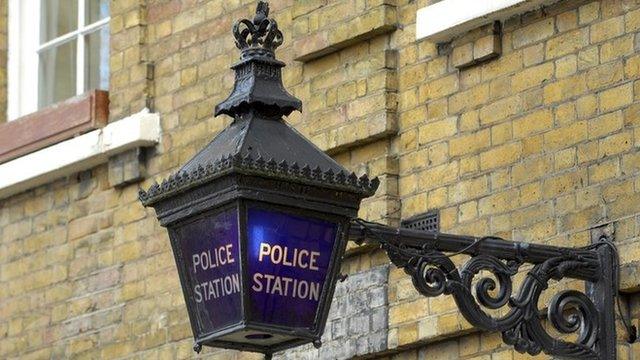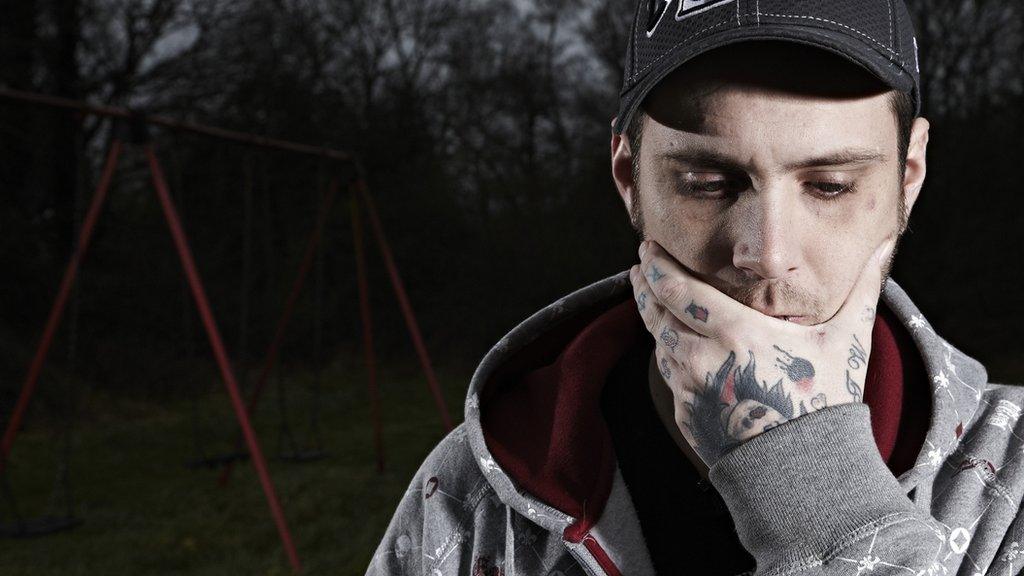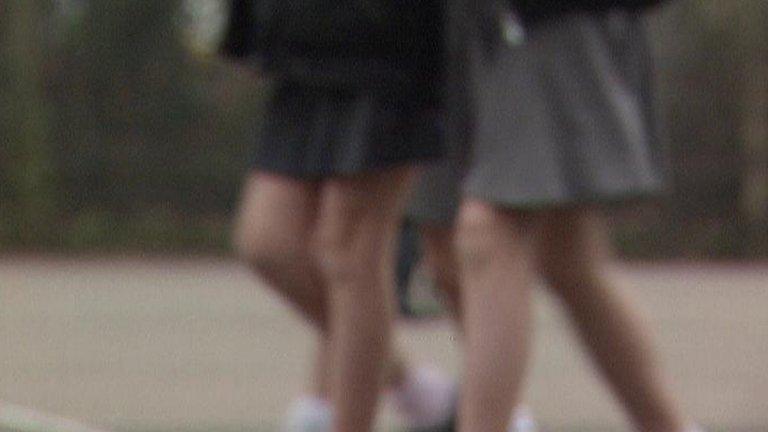Are 'paedophile hunters' hindering police?
- Published

Groups posing as under-age girls online to expose suspected paedophiles - commonly referred to as 'paedophile hunters' - say they gain quicker results than police. But is their work undermining official investigations?
In a bedsit in Newcastle-upon-Tyne, two men are using a laptop and smartphone to monitor the online conversations they have with adults they suspect to be paedophiles.
They form part of the group Dark Justice. It certainly isn't a technical crime unit, bustling with specialist investigators, but they say they are "actively fighting for change".
One of them calls himself Scott. It's not his real name, but he says he has to protect his identity because he has previously received threats.
"We want change and if it takes getting up at 7am in the morning and talking to these people until 10pm at night then that's what we'll have to do," he explains.
Det Supt Andrew Stokes says "vigilante" groups are on the rise
"When they're targeting a child, that child has to live with this for the rest of their life. If we can stop even one child from being abused, then surely that's worth it."
The men expose groomers by setting up profiles as young women on online friendship and dating sites. Once a suspect has contacted them, Dark Justice respond and say they are 13 years old.
Generally, they say, the younger age doesn't deter the adult men, but instead attracts more interest. One current message reads: "I will be ok with ur young sexxxy age if you are OK with mine?"

Watch Victoria Derbyshire weekdays from 09:15-11:00 BST on BBC Two and BBC News Channel, for original stories, in-depth interviews and the issues at the heart of public debate.
Follow the programme on Facebook, external and Twitter, external, and find all our content online.
The story was also featured on 5 Live Breakfast

Eventually, Dark Justice arrange a meeting with suspects - as the 13-year-old girl - in a public environment. Once they have identified and filmed the suspect, they call the police and hand over the evidence, including screen snapshots of the messages they have received online.
This evidence can be used in court, which is how Dark Justice exposed a 36-year-old in their latest sting. Kenneth Walker from Nottingham pleaded guilty to attempting to meet a girl following sexual grooming and is due to be sentenced at Newcastle Crown Court today.
But this form of evidence gathering can cause complications over whether the proof has been collected through entrapment.
Ian Kelcey, a defence solicitor and former chair of the Law Society's criminal law committee, has defended two clients in the past year who were exposed by members of the public.

Ian Kelcey says entrapment laws are a "grey area" in relation to groups' gathering of evidence
"It may not fall into entrapment if [groups like Dark Justice] are just in a chat room and are waiting for somebody to contact them," he explains.
"The problem is, when they start to entice somebody with [paedophilic] tendencies, then that becomes an entrapment, so it's a very grey area."
Entrapment isn't a criminal offence, although it can form part of the defence made by a suspect's lawyer.
The fact that it's legal, however, means groups like Dark Justice are free to set up as many profiles as they want.

Child sex abuse statistics
A Freedom of Information request found that 2,135 people were convicted of sex offences against children under the age of 16 in England and Wales in 2010. In 2005, there were 1,363 convictions.
The group Dark Justice say their work has led to 18 arrests of suspected paedophiles, the group LetzGo Hunting say their evidence is responsible for at least five criminal convictions and campaigner Stinson Hunter says his work has helped secure at least 17 convictions.
The police recorded 23,663 sexual offences against children in the UK in 2012/13, though experts believe the crime is vastly under-reported.
Child sexual abuse costs the UK £3.2bn a year, the NSPCC estimates, external.

One particular area of frustration for such groups is the fact they are referred to as "vigilantes" by police - a term that can be synonymous with unlawfulness.
"If you're walking down the street and you see someone smash a car window and give a statement to the police does that make you a vigilante? These people come to us," a member of the group Letzgo Hunting tells me. They prefer to be called "covert private investigators".
"We don't just gather evidence, we investigate someone, on behalf of private clients," he adds. "Our private clients are every single parent in this country."
Stinson Hunter is another campaigner who exposes suspect groomers.
"Using the word 'vigilante' discredits what I do," he claims. "I take evidence, put videos online and get people talking. I'd be doing police work if I was investigating for the police."
In 2013, Mr Hunter confronted a man who killed himself days after being questioned by detectives. More recently, he was knocked over by a car after confronting a man in public.
Risk 'is too great'
Det Supt Andrew Stokes is head of the public protection unit at Derbyshire Police. His unit has previously received information from Stinson Hunter and LetzGo Hunting.
"I think these groups and individuals should stop, and that's the view of most of my colleagues across the country," he explains. "The risks associated with the things they do on the internet are too great."
He believes this kind of activity is gathering momentum and has concerns about the evidence being obtained.
"It may not stand up to the scrutiny that's required in court," he says. "It may be that we're already targeting that person and any work that a vigilante does can undermine that."
"There's also the risk that a person who thinks they've been [exposed] as some sort of paedophile will go off as a missing person and we'll have a huge drain on resources trying to find them.

The potential use of additional special constables to help target online groomers is being discussed, Det Supt Stokes says
"We have had cases nationally where people have committed suicide. Let us, the police, do the investigations."
But it's unlikely that groups like Dark Justice will leave it to the police. They're driven by quick results.
They say they can expose suspects more quickly than forces in England and Wales who are "bound by red tape" and working with 16,000 fewer officers than they had five years ago.
Det Supt Stokes says conversations are already taking place nationally about using volunteers or additional special constables to help target online groomers.
However, these people would be vetted, and lawyers argue that this is the crucial difference with the civilian groups that exist today. They're self-appointed, they say, and nobody really knows their agenda.
Watch Victoria Derbyshire on weekdays from 09:15-11:00 BST on BBC Two and BBC News Channel. Follow the programme on Facebook, external and Twitter, external, and find all our content online.
- Published7 October 2014

- Published22 April 2013

- Published19 April 2015
